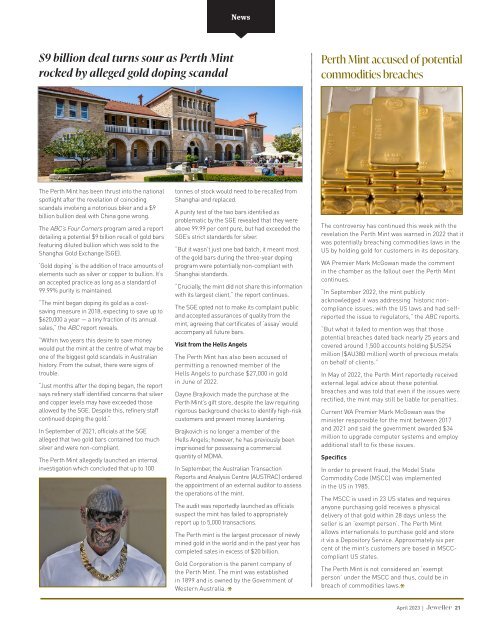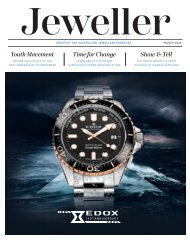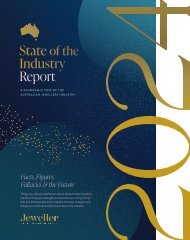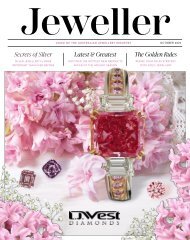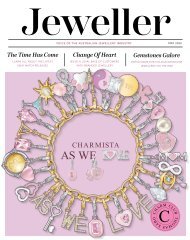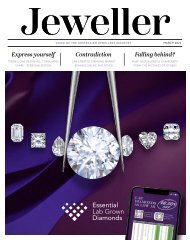Jeweller - April 2023
Create successful ePaper yourself
Turn your PDF publications into a flip-book with our unique Google optimized e-Paper software.
News<br />
$9 billion deal turns sour as Perth Mint<br />
rocked by alleged gold doping scandal<br />
Perth Mint accused of potential<br />
commodities breaches<br />
The Perth Mint has been thrust into the national<br />
spotlight after the revelation of coinciding<br />
scandals involving a notorious biker and a $9<br />
billion bullion deal with China gone wrong.<br />
The ABC’s Four Corners program aired a report<br />
detailing a potential $9 billion recall of gold bars<br />
featuring diluted bullion which was sold to the<br />
Shanghai Gold Exchange (SGE).<br />
‘Gold doping’ is the addition of trace amounts of<br />
elements such as silver or copper to bullion. It’s<br />
an accepted practice as long as a standard of<br />
99.99% purity is maintained.<br />
“The mint began doping its gold as a costsaving<br />
measure in 2018, expecting to save up to<br />
$620,000 a year — a tiny fraction of its annual<br />
sales,” the ABC report reveals.<br />
“Within two years this desire to save money<br />
would put the mint at the centre of what may be<br />
one of the biggest gold scandals in Australian<br />
history. From the outset, there were signs of<br />
trouble.<br />
“Just months after the doping began, the report<br />
says refinery staff identified concerns that silver<br />
and copper levels may have exceeded those<br />
allowed by the SGE. Despite this, refinery staff<br />
continued doping the gold.”<br />
In September of 2021, officials at the SGE<br />
alleged that two gold bars contained too much<br />
silver and were non-compliant.<br />
The Perth Mint allegedly launched an internal<br />
investigation which concluded that up to 100<br />
tonnes of stock would need to be recalled from<br />
Shanghai and replaced.<br />
A purity test of the two bars identified as<br />
problematic by the SGE revealed that they were<br />
above 99.99 per cent pure, but had exceeded the<br />
SGE’s strict standards for silver.<br />
“But it wasn’t just one bad batch, it meant most<br />
of the gold bars during the three-year doping<br />
program were potentially non-compliant with<br />
Shanghai standards.<br />
“Crucially, the mint did not share this information<br />
with its largest client,” the report continues.<br />
The SGE opted not to make its complaint public<br />
and accepted assurances of quality from the<br />
mint, agreeing that certificates of ‘assay’ would<br />
accompany all future bars.<br />
Visit from the Hells Angels<br />
The Perth Mint has also been accused of<br />
permitting a renowned member of the<br />
Hells Angels to purchase $27,000 in gold<br />
in June of 2022.<br />
Dayne Brajkovich made the purchase at the<br />
Perth Mint’s gift store, despite the law requiring<br />
rigorous background checks to identify high-risk<br />
customers and prevent money laundering.<br />
Brajkovich is no longer a member of the<br />
Hells Angels; however, he has previously been<br />
imprisoned for possessing a commercial<br />
quantity of MDMA.<br />
In September, the Australian Transaction<br />
Reports and Analysis Centre (AUSTRAC) ordered<br />
the appointment of an external auditor to assess<br />
the operations of the mint.<br />
The audit was reportedly launched as officials<br />
suspect the mint has failed to appropriately<br />
report up to 5,000 transactions.<br />
The Perth mint is the largest processor of newly<br />
mined gold in the world and in the past year has<br />
completed sales in excess of $20 billion.<br />
Gold Corporation is the parent company of<br />
the Perth Mint. The mint was established<br />
in 1899 and is owned by the Government of<br />
Western Australia.<br />
The controversy has continued this week with the<br />
revelation the Perth Mint was warned in 2022 that it<br />
was potentially breaching commodities laws in the<br />
US by holding gold for customers in its depositary.<br />
WA Premier Mark McGowan made the comment<br />
in the chamber as the fallout over the Perth Mint<br />
continues.<br />
“In September 2022, the mint publicly<br />
acknowledged it was addressing ‘historic noncompliance<br />
issues; with the US laws and had selfreported<br />
the issue to regulators,” the ABC reports.<br />
“But what it failed to mention was that those<br />
potential breaches dated back nearly 25 years and<br />
covered around 1,500 accounts holding $US254<br />
million ($AU380 million) worth of precious metals<br />
on behalf of clients.”<br />
In May of 2022, the Perth Mint reportedly received<br />
external legal advice about these potential<br />
breaches and was told that even if the issues were<br />
rectified, the mint may still be liable for penalties.<br />
Current WA Premier Mark McGowan was the<br />
minister responsible for the mint between 2017<br />
and 2021 and said the government awarded $34<br />
million to upgrade computer systems and employ<br />
additional staff to fix these issues.<br />
Specifics<br />
In order to prevent fraud, the Model State<br />
Commodity Code (MSCC) was implemented<br />
in the US in 1985.<br />
The MSCC is used in 23 US states and requires<br />
anyone purchasing gold receives a physical<br />
delivery of that gold within 28 days unless the<br />
seller is an ‘exempt person’. The Perth Mint<br />
allows internationals to purchase gold and store<br />
it via a Depository Service. Approximately six per<br />
cent of the mint’s customers are based in MSCCcompliant<br />
US states.<br />
The Perth Mint is not considered an ‘exempt<br />
person’ under the MSCC and thus, could be in<br />
breach of commodities laws.<br />
<strong>April</strong> <strong>2023</strong> | 21


